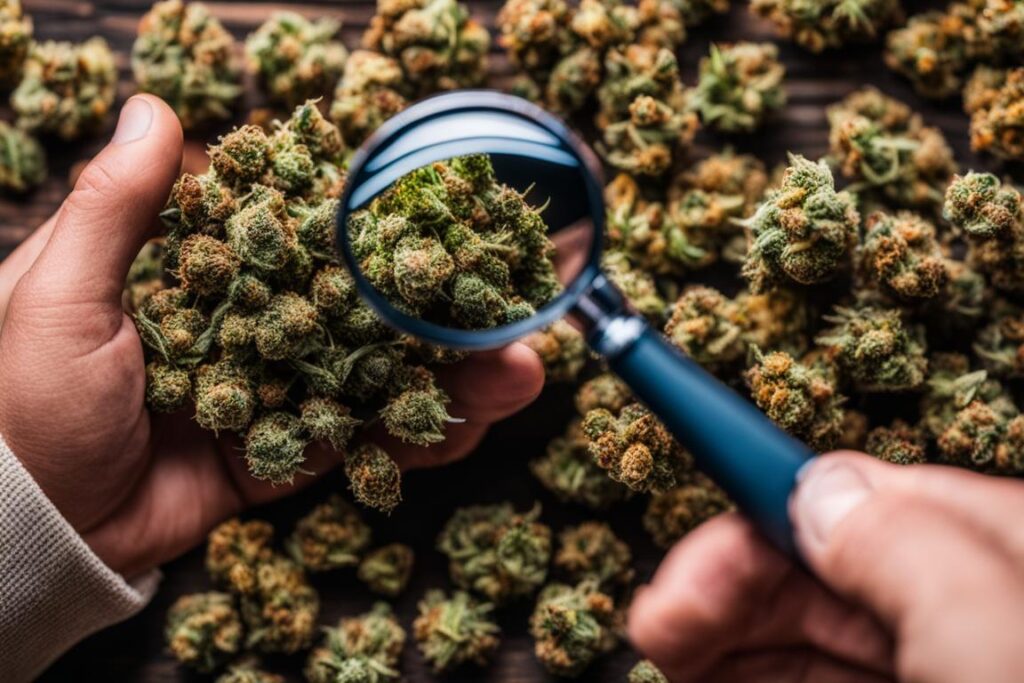Are you looking for a natural way to relieve anxiety and promote a sense of calm? Look no further than cannabis. This remarkable plant has been found to have positive effects on anxiety relief, offering a potential solution for those seeking natural wellness.
Studies have shown that the compounds in cannabis, such as CBD and THC, can help reduce anxiety symptoms and promote a sense of calm. CBD, in particular, has been found to decrease anxiety in patients with social anxiety disorder, according to a study published in the Journal of Clinical Psychology. Another study published in the Journal of Psychopharmacology found that THC can reduce symptoms of anxiety in individuals with generalized anxiety disorder.
These findings suggest that cannabis has the potential to be a natural remedy for anxiety relief, offering a promising alternative to traditional treatments. By understanding the science behind cannabis and anxiety, as well as the different types of anxiety disorders that can benefit from cannabis, you can make informed decisions about incorporating cannabis into your wellness routine.
Key Takeaways:
- Cannabis has been found to have positive effects on anxiety relief.
- The compounds in cannabis, such as CBD and THC, can help reduce anxiety symptoms.
- CBD has been shown to decrease anxiety in patients with social anxiety disorder.
- THC can reduce symptoms of anxiety in individuals with generalized anxiety disorder.
- Choosing the right cannabis strain and dosage is crucial for anxiety relief.
Understanding Cannabis and Anxiety
Cannabis contains various compounds that have been studied for their potential effects on anxiety relief. Two of the most widely known compounds found in cannabis are CBD (cannabidiol) and THC (delta-9-tetrahydrocannabinol). CBD is a non-psychoactive compound that has been shown to have anxiolytic properties, meaning it can help reduce anxiety. THC, on the other hand, is a psychoactive compound that can induce feelings of relaxation and euphoria.
When it comes to anxiety disorders, CBD is often favored due to its non-intoxicating nature and potential anti-anxiety effects. CBD interacts with the body’s endocannabinoid system, which plays a crucial role in regulating various physiological processes, including mood and anxiety. By binding to cannabinoid receptors, CBD may modulate serotonin levels and promote feelings of relaxation. Serotonin is a neurotransmitter that is often associated with feelings of well-being and happiness. CBD may also enhance the activity of GABA, a neurotransmitter that helps calm excessive brain activity.
THC, on the other hand, may provide a more euphoric and relaxing experience. It can help reduce symptoms of anxiety in individuals with generalized anxiety disorder. However, due to its psychoactive effects, THC can cause feelings of intoxication and impaired cognitive function, which may not be suitable for everyone.
The Role of CBD and THC in Anxiety Relief
Research suggests that CBD and THC may have different mechanisms of action when it comes to anxiety relief. CBD is believed to have anxiolytic properties and interacts with the endocannabinoid system and other neurotransmitter systems to promote relaxation. THC, on the other hand, may reduce anxiety through its psychoactive effects and interaction with the endocannabinoid system.
Both CBD and THC have shown potential in reducing symptoms of anxiety in various anxiety disorders. However, it’s important to note that the effectiveness of cannabis as a treatment for anxiety may vary from person to person. Finding the right cannabis strain and dosage is crucial for achieving optimal anxiety relief.
| Cannabis Compound | Anxiety Relief Effects |
|---|---|
| CBD | Non-intoxicating, potential anti-anxiety effects, relaxation |
| THC | Psychoactive, euphoria, relaxation |
The Science Behind Cannabis and Anxiety Relief
When it comes to understanding how cannabis can provide anxiety relief, it’s important to explore the science behind it. The endocannabinoid system, a complex network of receptors in the body, plays a crucial role in regulating various physiological processes, including mood and anxiety. This system is where the compounds found in cannabis, such as CBD and THC, interact to produce therapeutic effects.
CBD, or cannabidiol, is a non-psychoactive compound that has gained attention for its potential anxiolytic properties. It interacts with cannabinoid receptors in the endocannabinoid system, potentially modulating serotonin levels and promoting feelings of relaxation. Serotonin is a neurotransmitter often associated with well-being and happiness. CBD may also enhance the activity of GABA, a neurotransmitter that helps calm excessive brain activity, further contributing to anxiety relief.
On the other hand, THC, or delta-9-tetrahydrocannabinol, is a psychoactive compound that can induce relaxation and euphoria. While THC is not typically favored for anxiety relief due to its psychoactive effects, some individuals may find it helpful for managing symptoms of anxiety. However, it’s important to note that THC can also increase anxiety in some people, so finding the right balance is crucial.
By affecting neurotransmitters like serotonin and GABA, cannabis compounds can help alleviate anxiety symptoms and promote a sense of calm. However, it’s important to understand that individual responses to cannabis may vary, and finding the right strain and dosage tailored to each person’s needs is key to achieving the desired anxiety relief.

The Role of the Endocannabinoid System
The endocannabinoid system, composed of receptors and natural cannabinoids produced by the body, helps regulate various physiological processes, including mood, pain, and anxiety. When cannabis compounds like CBD and THC are introduced into the body, they interact with the endocannabinoid system, potentially influencing anxiety levels. CBD, specifically, has been found to bind to cannabinoid receptors and modulate serotonin levels, contributing to its anxiolytic effects. Understanding the role of the endocannabinoid system provides insights into the mechanisms by which cannabis can provide anxiety relief.
| Neurotransmitter | Role in Anxiety | Effect of CBD |
|---|---|---|
| Serotonin | Associated with well-being and happiness | Potentially modulates levels, promoting relaxation |
| GABA | Calms excessive brain activity | Enhances activity, aiding in anxiety reduction |
“The endocannabinoid system plays a crucial role in the regulation of anxiety. Cannabis compounds like CBD and THC interact with this system, potentially modulating neurotransmitters like serotonin and GABA to promote relaxation and alleviate anxiety symptoms.”
It’s important to note that while cannabis can provide anxiety relief, it may not be suitable for everyone. Individual responses to cannabis and its compounds can vary, and some individuals may experience increased anxiety or other side effects. It’s recommended to consult with a healthcare professional before incorporating cannabis into an anxiety treatment plan and to start with low doses, gradually increasing as needed.
Types of Anxiety Disorders and Cannabis Benefits
When it comes to treating anxiety disorders, cannabis has shown potential benefits for various types of conditions. Here, we will explore how cannabis can be used to alleviate symptoms in social anxiety disorder, generalized anxiety disorder, panic disorder, and post-traumatic stress disorder (PTSD).
Social Anxiety Disorder
Social anxiety disorder is characterized by an intense fear of social situations and interactions. People with this disorder may experience extreme anxiety, self-consciousness, and worry about being judged by others. Cannabis, particularly CBD-dominant strains, has been found to reduce anxiety and improve performance during public speaking, a common trigger for social anxiety. CBD’s anxiolytic properties help individuals feel more relaxed and at ease in social settings.
Generalized Anxiety Disorder
Generalized anxiety disorder is characterized by excessive and persistent worries about various aspects of life. Individuals with this disorder may experience chronic anxiety, restlessness, difficulty concentrating, and irritability. THC-dominant strains of cannabis have been shown to decrease worry and tension, providing relief for individuals with generalized anxiety disorder. However, it’s important to find the right dosage to ensure the desired effects without excessive psychoactive sensations.
Panic Disorder
Panic disorder is characterized by recurrent panic attacks, which are sudden episodes of intense fear or discomfort. These attacks can be accompanied by physical symptoms such as a rapid heart rate, sweating, trembling, and shortness of breath. While research on cannabis specifically for panic disorder is limited, some individuals with this condition report finding relief from panic attacks with the use of cannabis. Finding the right strain and dosage is crucial to manage symptoms effectively.
Post-Traumatic Stress Disorder (PTSD)
Post-traumatic stress disorder is a mental health condition that may develop after experiencing or witnessing a traumatic event. Individuals with PTSD may experience intrusive thoughts, nightmares, flashbacks, and intense anxiety. Cannabis has shown promise in alleviating symptoms of PTSD, particularly in reducing hyperarousal and anxiety. CBD’s ability to modulate the endocannabinoid system and regulate neurotransmitters may contribute to its potential benefits in managing PTSD symptoms.
Finding the Right Cannabis Strain and Dosage
When it comes to using cannabis for anxiety relief, finding the right strain and dosage is essential. Different strains of cannabis have varying levels of CBD and THC, which can influence their effects on anxiety. It’s important to understand the differences between CBD-dominant strains, THC-dominant strains, and balanced strains to make an informed decision.
The Different Types of Cannabis Strains:
| Strain Type | Description |
|---|---|
| CBD-dominant strains | These strains have higher levels of CBD and lower levels of THC. They are often recommended for individuals who are sensitive to the psychoactive effects of THC. CBD-dominant strains are known for their calming properties and can provide anxiety relief without intoxication. |
| THC-dominant strains | These strains have higher levels of THC and lower levels of CBD. They can induce a more euphoric and relaxing experience. While THC can provide anxiety relief, it’s important to be aware of the psychoactive effects and start with a lower dosage. |
| Balanced strains | These strains have equal amounts of CBD and THC. They offer a combination of both calming and uplifting effects. Balanced strains can be a good option for individuals who want to experience the benefits of both CBD and THC. |
It’s important to note that everyone’s response to cannabis can vary, so it may take some trial and error to find the right strain for your anxiety relief.
Finding the Optimal Dosage:
When it comes to dosage, it’s always recommended to start with a low dose and gradually increase it until you find the optimal level for anxiety relief. This approach allows you to gauge the effects of cannabis on your anxiety symptoms without overwhelming yourself with a high dose.
Keep in mind that the optimal dosage can vary depending on factors such as your body weight, metabolism, and individual tolerance. It’s best to consult with a healthcare professional or a knowledgeable budtender who can provide guidance on finding the right dosage for your specific needs.

Potential Risks and Side Effects
While cannabis can offer anxiety relief, it’s important to be aware of potential risks and side effects. The psychoactive effects of THC can cause feelings of intoxication and impaired cognitive function. Some individuals may also develop a dependency on cannabis. Additionally, cannabis can interact with certain medications, so it’s essential to consult with a healthcare professional before incorporating cannabis into your anxiety treatment plan. Common side effects of cannabis include dry mouth, increased heart rate, and changes in mood or appetite.
It’s important to note that the psychoactive effects of THC can vary depending on the strain and dosage used. THC-dominant strains may have a greater potential for intoxication, while CBD-dominant strains are less likely to produce psychoactive effects. However, even CBD-dominant strains can cause side effects, albeit milder ones. It’s essential to start with a low dose and monitor your body’s response to cannabis to minimize the risk of adverse effects.
“Although cannabis can be effective in relieving anxiety, it’s important to use it responsibly and be aware of the potential risks. Regular use of cannabis, especially high-THC strains, can lead to the development of cannabis use disorder and dependence. Additionally, cannabis can interact with certain medications, including sedatives and antidepressants, which may increase the risk of side effects or impact the effectiveness of the medication. It’s crucial to consult with a healthcare professional before incorporating cannabis into your anxiety treatment plan to ensure it is safe and appropriate for you.”
To minimize the potential risks and side effects of cannabis, it’s advisable to start with a low dosage and gradually increase it until you find the optimal level for anxiety relief. It’s also important to use cannabis in moderation and avoid excessive or frequent use. If you experience any severe or persistent side effects, it’s important to seek medical attention. Remember, everyone’s response to cannabis can vary, so it’s crucial to listen to your body and adjust your usage accordingly.
Conclusion
In conclusion, while cannabis can offer anxiety relief, it’s important to approach its use with caution. Understanding the potential risks and side effects can help you make informed decisions and minimize any negative impacts. Consulting with a healthcare professional is essential to ensure cannabis is safe and appropriate for your individual situation. By incorporating cannabis responsibly into your anxiety treatment plan, you can potentially experience the benefits of this natural remedy while minimizing any potential harm.
Other Health Benefits of Cannabis
While cannabis is widely known for its potential in anxiety relief, it also offers a range of other health benefits. Research has shown that cannabis can be effective in managing chronic pain, making it a potential option for individuals struggling with conditions such as neuropathic pain, multiple sclerosis, and fibromyalgia. The natural compounds in cannabis interact with the body’s endocannabinoid system to help alleviate pain and promote a sense of well-being.

Furthermore, cannabis can also have positive effects on sleep. Many individuals with insomnia or sleep disorders have reported improved sleep quality and duration when using cannabis. The calming properties of certain cannabis strains, particularly those high in CBD, can help relax the mind and body, allowing for a more restful sleep.
In addition to pain management and sleep improvement, cannabis also possesses anti-inflammatory properties. Inflammation is a common underlying factor in various chronic conditions, including arthritis. The cannabinoids in cannabis have been found to interact with the body’s immune system, potentially reducing inflammation and providing relief from symptoms.
Incorporating Cannabis into a Holistic Wellness Routine
When it comes to finding natural ways to promote overall well-being, incorporating cannabis into a holistic wellness routine can be a game-changer. Alongside self-care practices and mindfulness techniques, cannabis can provide a unique and effective approach to anxiety relief and relaxation.
As we prioritize our wellness, it’s important to establish self-care practices that nourish both the body and mind. Regular exercise not only keeps us physically fit, but also releases endorphins that boost mood and reduce stress. Pairing cannabis with activities like yoga or hiking can enhance the overall experience, deepening the connection between mind, body, and nature.
Mindfulness techniques are another valuable tool in our wellness arsenal. By incorporating meditation and deep breathing exercises into our daily routines, we can cultivate a sense of calm and clarity. Combining these practices with the anxiety-relieving effects of cannabis can further amplify their benefits, allowing us to fully embrace a state of relaxation and tranquility.
Taking a holistic approach means recognizing that cannabis is just one component of a larger puzzle. Healthy eating habits, nourishing our bodies with nutritious foods, contribute to our overall well-being. By focusing on whole foods and avoiding processed options, we can optimize our physical and mental health, allowing cannabis to work in harmony with our bodies.
FAQ
Can cannabis help with anxiety relief?
Yes, studies have shown that the compounds in cannabis, such as CBD and THC, can help reduce anxiety symptoms and promote a sense of calm.
What are the main compounds in cannabis that have anxiety-relieving effects?
The main compounds in cannabis that have anxiety-relieving effects are CBD (cannabidiol) and THC (delta-9-tetrahydrocannabinol).
How does CBD help reduce anxiety?
CBD interacts with the body’s endocannabinoid system, potentially modulating serotonin levels and promoting feelings of relaxation. It may also enhance the activity of GABA, a neurotransmitter that helps calm excessive brain activity.
What types of anxiety disorders can cannabis benefit?
Cannabis has shown potential benefits for individuals with social anxiety disorder, generalized anxiety disorder, panic disorder, and post-traumatic stress disorder (PTSD).
What is the recommended dosage of cannabis for anxiety relief?
It’s important to start with a low dose and gradually increase it to find the optimal level for anxiety relief. The choice of cannabis strain, such as CBD-dominant, THC-dominant, or balanced strains, should also be considered.
Are there any risks or side effects associated with using cannabis for anxiety relief?
Yes, cannabis can have psychoactive effects, cause feelings of intoxication, and impair cognitive function. Some individuals may also develop a dependency on cannabis. It’s important to consult with a healthcare professional before incorporating cannabis into your anxiety treatment plan.
What other health benefits does cannabis have?
Cannabis has shown promise in managing chronic pain, improving sleep quality, and reducing inflammation in conditions such as arthritis.
How can cannabis be incorporated into a holistic wellness routine?
Cannabis can be part of a holistic wellness routine by combining it with self-care practices such as regular exercise, healthy eating, stress management techniques, and mindfulness techniques like meditation and deep breathing exercises.
Author Profile

Latest entries
 BlogFebruary 20, 2024I Just Found the Ultimate Clog-Free Vape Cartridge! (Yes, They Exist!)
BlogFebruary 20, 2024I Just Found the Ultimate Clog-Free Vape Cartridge! (Yes, They Exist!) BlogJanuary 16, 2024In the Clouds with Creativity: A Blunt Encounter with Montreal’s Fluid Art Maestro
BlogJanuary 16, 2024In the Clouds with Creativity: A Blunt Encounter with Montreal’s Fluid Art Maestro BlogDecember 25, 2023Sativa: Enhancing Outdoor Adventures
BlogDecember 25, 2023Sativa: Enhancing Outdoor Adventures BlogDecember 25, 2023Enhancing Memory with Sativa
BlogDecember 25, 2023Enhancing Memory with Sativa





